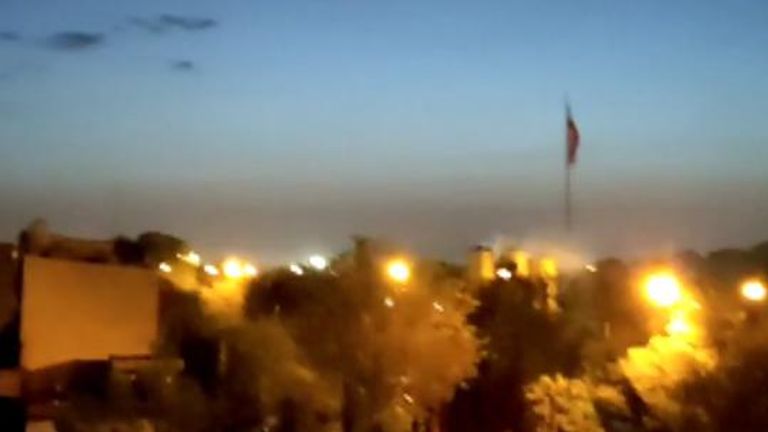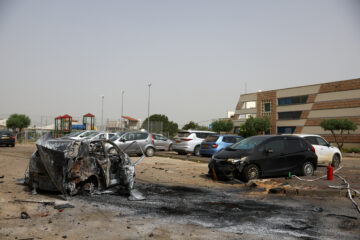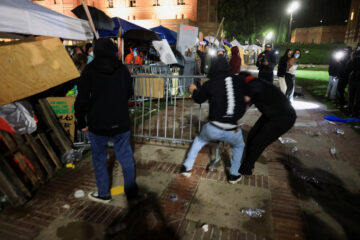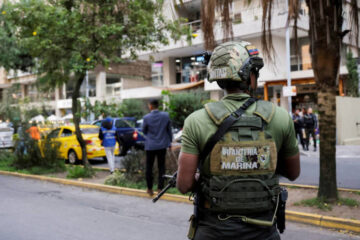Israel launches retaliatory strikes against Iran
 'Blasts' shown over Iran in IRGC video
'Blasts' shown over Iran in IRGC videoIran’s state media reported explosions in the central province of Isfahan Friday, as US media quoted officials saying Israel had carried out retaliatory strikes on its arch-rival.
Air defence systems over several Iranian cities were activated, state media reported, after the country’s official broadcaster said explosions were heard near the city of Isfahan.
Israel had previously warned it would hit back after Iran fired hundreds of missiles and drones at Israel almost a week ago, in retaliation for a deadly strike — which Tehran blamed on its foe — that levelled Iran’s consular annex at its embassy in Syria.
Fears of a major regional spillover from the Gaza war have since soared.
Iran’s Fars news agency reported “three explosions” were heard near Qahjavarestan, near Isfahan airport and the 8th Shekari army airbase, while Iran’s space agency spokesman Hossein Dalirian said “several” drones had been “successfully shot down”.
Dalirian said on social media platform X there were “no reports of a missile attack”.
“Reports indicate there was no major damage or large explosions caused by the impact of any air threat,” the official IRNA news agency said.
The senior military officer in Isfahan, Brigadier General Siavash Mihandoost, told state television that the loud sound that people had heard was caused by defence systems shooting at a target in the air, not an explosion on the ground.
Nuclear facilities in Isfahan were reported to be “completely secure”, Iran’s Tasnim news agency said.
Washington received advance notice of Israel’s reported strike, but did not endorse the operation or play any part in its execution, US media quoted officials as saying.
NBC and CNN, citing sources familiar with the matter and a US official, respectively, said Israel had provided Washington with pre-notification of the strike.
CNN quoted one official as stating the target was not a nuclear facility.
There was no immediate comment from the White House or Pentagon.
The Israeli military told AFP: “We don’t have a comment at this time.”
– Strikes in Syria –
Overnight on April 13 Iran carried out its first attack to directly target Israel, its regional foe.
Israel, backed by its allies, intercepted most of the 300 missiles and drones launched by Iran, and suffered no deaths.
Iran launched its attack in retaliation for the April 1 strike on its consulate in Damascus. In that attack, seven of Iran’s Revolutionary Guards including two generals were killed.
Iran-backed groups have bolstered President Bashar al-Assad’s forces since the start of Syria’s civil war in 2011.
Iran is also a key backer of the Palestinian militant group Hamas and Lebanon’s Hezbollah.
Israeli Prime Minister Benjamin Netanyahu, who has vowed to destroy Hamas over its October 7 attack that started the Gaza war, has stressed that Israel “reserves the right to protect itself” against Iran.
The United States, Israel’s main ally and military supplier, has made clear it would not join a reprisal attack on Iran, but unveiled sanctions against people and entities involved in producing the drones deployed in the Iranian assault.
“We are holding Iran accountable,” US President Joe Biden said Thursday, announcing the measures after the European Union said it would also sanction Iran’s drone programme.
After its missile and drone barrage against Israel, Iran had declared the matter concluded. But Iranian Foreign Minister Hossein Amir-Abdollahian had warned that Tehran would make Israel “regret” any new attack on the Islamic republic.
The explosions in Iran coincided with the 85th birthday of Iran’s supreme leader Ayatollah Ali Khamenei.
Flights were suspended across swathes of Iran on Friday, with the UAE-based flydubai airline cancelling flights to the country, but Tehran’s two major airports later resumed service.
– Mideast ‘on a precipice’ –
Israeli strikes also hit a military position in Syria’s south, according to the Syrian Observatory for Human Rights war monitor.
The dawn strikes “targeted a radar installation of the Syrian army” between the provinces of Sweida and Daraa provinces, said Rami Abdel Rahman, who heads the Observatory.
On Thursday, UN Secretary-General Antonio Guterres painted a dark picture of the situation in the Middle East, warning that spiralling tensions over the war in Gaza and Iran’s attack on Israel could devolve into a “full-scale regional conflict.”
“The Middle East is on a precipice. Recent days have seen a perilous escalation — in words and deeds,” Guterres told the Security Council.
“One miscalculation, one miscommunication, one mistake, could lead to the unthinkable — a full-scale regional conflict that would be devastating for all involved,” he said, calling on all parties to exercise “maximum restraint.”
Oil prices surged more than three percent in early Asian trade on Friday following the reports of explosions.
AFP, AGENCIES











